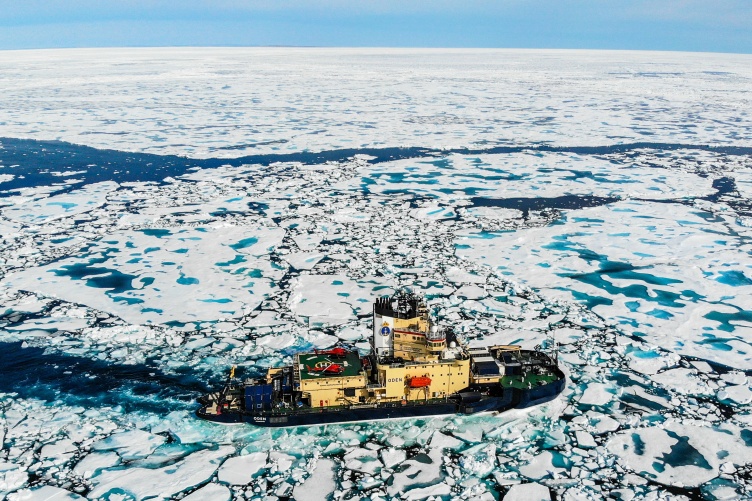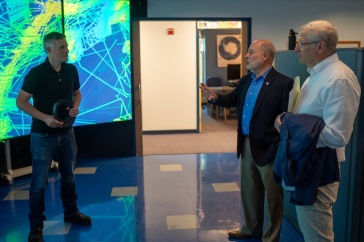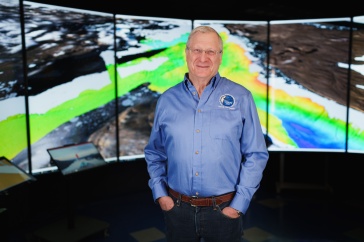
Photo courtesy of Tomer Ketter.
The University of New Hampshire's Center for Coastal and Ocean Mapping (CCOM) has received a $38.5 million grant over five years from the National Oceanic and Atmospheric Administration (NOAA) to continue the work of the Joint Hydrographic Center (JHC), a NOAA partnership to support innovative research and training in ocean mapping. The award was announced by members of the New Hampshire delegation including U.S. Senator Jeanne Shaheen (D-NH), who is the Ranking Member on the Commerce, Justice, Science and Related Agencies Appropriations subcommittee.
"We're grateful for the unwavering support of Sen. Shaheen and other members of the New Hampshire delegation to ensure the continued work of UNH's Joint Hydrographic Center," said Larry Mayer, founding director of CCOM and co-director of the JHC. "Our ongoing research, training, and development of state-of-the-art technologies have made us an international center of excellence. We look forward to helping define the next generation of ocean mapping technologies that will support the nation in its efforts to conserve and manage the critical ocean resources that support and sustain us.”
The JHC has had a long history of developing tools and techniques that have had major impacts on the field of hydrography and ocean mapping. JHC researchers have developed innovative new approaches to increase the efficiency and accuracy of ocean mapping data processing, pioneered the use of autonomous vehicles for hydrographic and other ocean mapping applications, developed tools to locate, visualize and quantify gas and oil seeps, explored the use of ocean mapping data to better understand seafloor and fisheries habitat, and developed innovative new approaches for visualizing, in both 3D and 4D, a range of oceanographic and ocean mapping data.
Among the JHC’s numerous achievements over the years, Mayer notes with pride that the center has trained a number of today's leaders in the field of hydrography and ocean mapping. In addition, the JHC’s collaborations with government agencies and industry partners have proven immensely fruitful for the advancement of the ocean mapping field – partnerships that can now continue with this new round of funding.
“I am thrilled that NOAA will continue its support for the Joint Hydrographic Center at the University of New Hampshire,” says Rear Adm. Shepard Smith, who serves as the director for NOAA’s Office of Coast Survey. “This has been Coast Survey's most important partnership in the past two decades as we have led the global hydrographic community in technology and advanced navigation services, and integrated these services across the ocean mapping community.”
Looking toward their goals for the next five years, Mayer says the JHC will continue to lead in the development of the tools and approaches for defining the next generation of hydrography and training the next generation of hydrographers and ocean mappers. He notes that their efforts will focus on making autonomous mapping systems “truly autonomous,” taking advantage of artificial intelligence and machine learning tools to provide situational awareness for those vehicles, while also developing edge processing software that will work on those vehicles to minimize the data that needs to be transmitted back to shore. Researchers will also focus on the concept of “characterizing” the seafloor looking for techniques that will allow sonars to better determine what it is looking at as well as take advantage of both virtual and augmented reality to provide the mariner or the scientist the ability to intuitively interpret and analyze complex situations.
The Institute for the Study of Earth, Oceans, and Space (EOS) is UNH’s largest research enterprise, comprising six centers with a focus on interdisciplinary, high-impactresearch on Earth and climate systems, space science, the marine environment, seafloor mapping, and environmental acoustics. With more than $58 million in external funding secured annually, EOS fosters an intellectual and scientific environment that advances visionary scholarship and leadership in world-class research and graduate education.
-
Written By:
Rebecca Irelan | Institute for the Study of Earth, Oceans, and Space | rebecca.irelan@unh.edu | 603-862-0990
















































